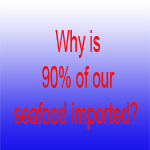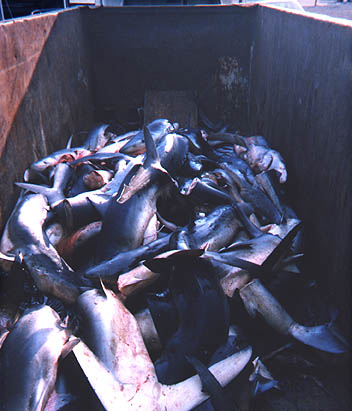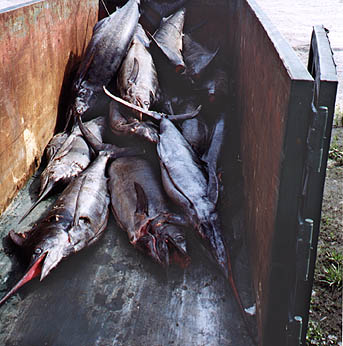A large part of the anti-swordfish consuming
campaign has focused on alleged large amounts of bycatch in the longline
fishery (bycatch is composed of those fish that are caught unintentionally
while targetting other species). The allegations of large, uncontrollable
levels of longline bycatch are generally made by the so-called big game
fishermen who spend thousands of dollars a day chasing "trophy" fish like
large sharks, tuna and billfish from yachts costing hundreds of thousands
of dollars or more [ for
an idea of what one of these "fishing machines" looks like]. for
an idea of what one of these "fishing machines" looks like].
Much of the big game angling world revolves around
tournaments - events which attract these yachts and their well-to-do owners
from thousands of miles away. Supposedly, considering the prize money offered
as well as the side bets, in particular tournaments hundreds of thousands
of dollars can depend on who catches the largest of particular species
of fish.
Recently much has been made of what are known
as "catch and release" tournaments. These are contests in which the sportsmen
will hook and battle to exhaustion one of these trophy fish, measure it
at boatside and then - possibly after swishing it back and forth in the
water a few times to "rejuvenate" it - release it to either provide entertainment
to another sportsman on another day or all the sharks in the neighborhood
with a large and easy meal.
Of course, with tens or hundreds of thousands
of dollars riding on the relative size of the fish caught, its probably
much more comforting to the sportsmen involved to actually bring their
fish in to be weighed. Thus we still have a significant number of "catch
and kill" tournaments. As the photos on this page illustrate much to well,
these tournaments can and do result in incredible waste. (The primary reason
for this waste - and one of the reasons for the billfish "bycatch" that
the big-game sportsfishing community constantly blasts the longliners for
- is that those same big game anglers have made it illegal to sell
billfish, including the marlin that are considered a delicacy in most parts
of the world, caught in Atlantic coastal waters.)
While we don't doubt that some of our recreationally
oriented, sports fishing colleagues do actually share the conservation
ethic with working fishermen whose lives have depended on practising (rather
than preaching) conservation for generations, we do question how they can
countenance such waste as these photos demonstrate on an on-going basis
from their fellow sportsmen. |




